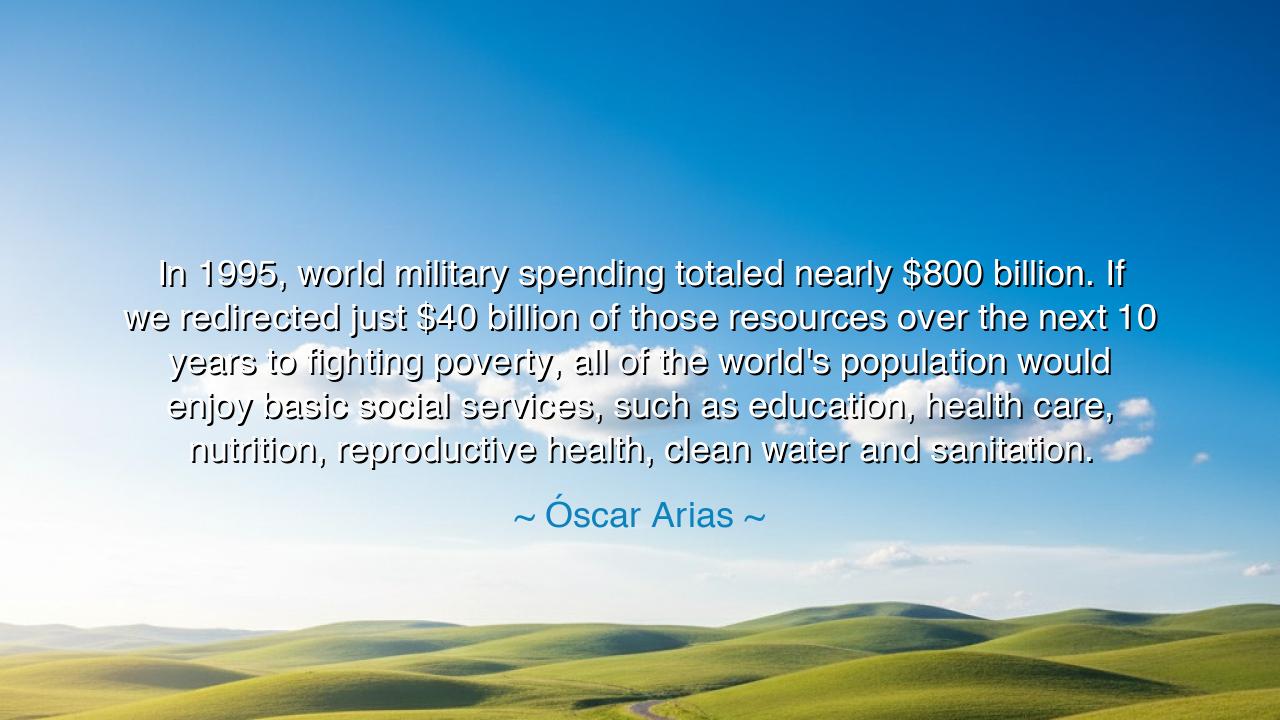
In 1995, world military spending totaled nearly $800 billion. If
In 1995, world military spending totaled nearly $800 billion. If we redirected just $40 billion of those resources over the next 10 years to fighting poverty, all of the world's population would enjoy basic social services, such as education, health care, nutrition, reproductive health, clean water and sanitation.






The words of Óscar Arias — “In 1995, world military spending totaled nearly $800 billion. If we redirected just $40 billion of those resources over the next 10 years to fighting poverty, all of the world’s population would enjoy basic social services, such as education, health care, nutrition, reproductive health, clean water and sanitation.” — resound like a cry from the heart of wisdom itself. They are not the words of a dreamer, but of a statesman who has seen both the light and the shadow of power. Beneath their calm reason lies a truth as old as civilization: that the true strength of a nation lies not in its armies, but in the well-being of its people.
Arias, a Nobel Peace Prize laureate and former president of Costa Rica, spoke these words out of both experience and conviction. His homeland, a small nation without an army since 1948, stands as living proof that peace is not the fruit of weapons, but of will. In choosing to abolish its military, Costa Rica chose education over aggression, healing over harm, and wisdom over fear. And from that decision flowed prosperity, literacy, and stability — a lesson to the world that security is born not from the barrel of a gun, but from the enlightenment of a people. His words thus carry the authority of example, not theory.
The origin of his reflection lies in the paradox of human civilization. Since the dawn of nations, mankind has poured its treasures into war — iron, fire, and blood offered upon the altar of pride. Yet, as Arias points out, a fraction of this same power could eradicate poverty and disease, could lift the weary from hunger and give the children of the earth a chance to learn, to grow, to dream. The ancient philosophers would have called this the madness of imbalance — when mankind, though wise enough to build empires, forgets the art of compassion. His words remind us that the true enemy of civilization is not another nation, but ignorance, inequality, and indifference.
History bears witness to this truth. After the devastation of the Second World War, the United States and its allies launched the Marshall Plan, investing billions not in conquest but in reconstruction. Europe rose from ruins not because of domination, but because of investment in humanity. Schools reopened, cities were rebuilt, and peace returned. It was a lesson in the power of generosity — that when resources are turned toward life rather than death, the world heals faster than any weapon can destroy. Yet, as the decades passed, that lesson faded, and the engines of war began again to consume the wealth of nations.
Arias’s call is not merely political — it is moral and spiritual. For every missile built, a child remains uneducated. For every tank forged, a village remains without clean water. The ancients would have seen such imbalance as an affront to the natural order. The wise kings of old were measured not by the reach of their armies, but by the prosperity of their people. The philosopher Confucius once said, “To govern is to correct.” And what greater correction could there be than to turn the swords of humanity into plowshares, and its armies into teachers, doctors, and builders?
But Arias’s message is also a challenge. He calls upon each generation to look upon its budgets, its priorities, and its conscience. He asks not for sacrifice, but for redirection — for forty billion dollars out of eight hundred, a mere fraction of the whole. It is not an impossible dream; it is a moral test. It asks: will humanity choose fear or compassion? Will it continue to invest in its own destruction while millions go hungry, or will it dare to imagine a world where peace is the greatest weapon of all?
So, my children, take this wisdom into your hearts: true peace is not the absence of war, but the presence of justice. Each of us, in our lives, wields power — not of governments, but of choice. We may not command armies, but we command influence, compassion, and example. Support the causes that build rather than destroy. Speak for those without voice. Give where others take. And remember that every act of kindness, every investment in human life, is a small redirection of the world’s wealth toward the good.
Thus, Óscar Arias’s words endure not as a plea, but as prophecy. For one day, the nations of the earth must awaken and see that the greatest strength lies not in domination, but in unity; not in defense, but in dignity. When that day comes, and humanity finally chooses life over fear, creation over conflict, and compassion over control, then the wealth of the world will truly serve its purpose — not to arm the few, but to uplift the many. And then, at last, peace will not be a dream, but the inheritance of all.






AAdministratorAdministrator
Welcome, honored guests. Please leave a comment, we will respond soon